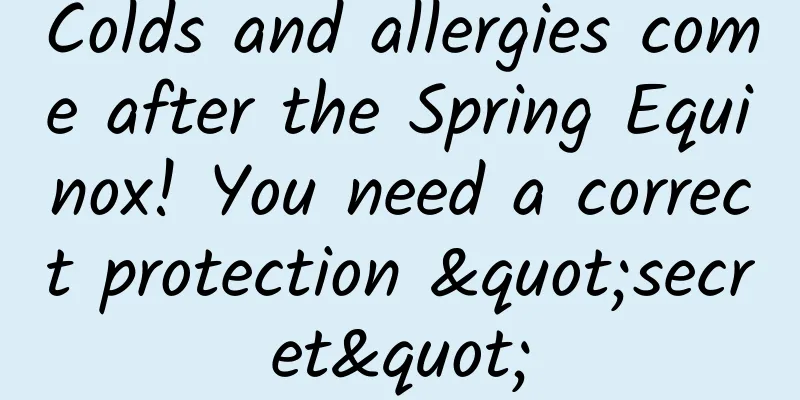Colds and allergies come after the Spring Equinox! You need a correct protection "secret"

|
After the spring equinox, the temperature gradually rises. However, the warm spring breeze not only brings a vibrant scene, but also quietly blows the troubles of allergy season. Recently, there has been a significant increase in cases of respiratory viral infections or allergies with upper respiratory and/or gastrointestinal symptoms, both in children and adults. When a cold meets an allergy, the symptoms are intertwined, which aggravates the patient's discomfort. For this reason, many patients take leave at home and are unable to study and work normally. When colds and allergies "meet unexpectedly", which symptoms will be aggravated? How to prevent and deal with them correctly? Gong Pihua, deputy chief physician of the Department of Respiratory and Critical Care Medicine of Peking University People's Hospital, and Ding Mingming, attending physician of the Department of Pediatrics, provide scientific interpretations and practical suggestions. Reasons behind the increase in cases after the Spring Equinox Xiaoyu is a primary school student. After the spring equinox, he suddenly began to sneeze and have a runny nose, and his eyes became itchy. His mother thought he just had a common cold, so she gave him some cold medicine. However, a few days later, Xiaoming developed symptoms of nausea, vomiting, and diarrhea. His mother quickly took him to the hospital for a checkup, and the doctor diagnosed him with allergies and gastrointestinal viral infection. Ms. Zhang, an office worker, had been feeling sore in her throat and had a slight cough recently. She thought she had a cold, so she took some cold medicine. However, a few days later, her cough became more and more severe, and she also developed fever and difficulty breathing. She rushed to the hospital for treatment, and the doctor found that she had allergic asthma combined with respiratory viral infection. After the spring equinox, the temperature rises, everything comes back to life, and the concentration of allergens such as pollen and dust mites in the air increases significantly. For people with allergies, this is undoubtedly a "disaster". They may experience allergic symptoms such as sneezing, runny nose, itchy eyes, red and swollen skin, and in severe cases, even asthma attacks. At the same time, with the change of seasons and climate, some respiratory viruses have also become active, such as the new coronavirus, respiratory syncytial virus, adenovirus, etc. These viruses are mainly transmitted through the air, and infection can cause respiratory symptoms such as fever, cough, sore throat, etc. Gastrointestinal viruses are not to be outdone, such as norovirus and rotavirus, which are transmitted through food, water or contact, and infection can cause gastrointestinal symptoms such as nausea, vomiting, diarrhea, abdominal pain, etc. When a cold encounters allergies, which symptoms will be aggravated? Some people think that colds and allergies are two different diseases and will not affect each other. In fact, both colds and allergies can cause respiratory inflammation. When both occur at the same time, the inflammation will be more severe and the symptoms will be more obvious. Colds are mainly manifested by nasal congestion, runny nose, cough, sore throat, etc., while allergies are mainly manifested by skin itching, redness, swelling, sneezing, runny nose, etc. When a cold encounters an allergy, the following symptoms may be aggravated: Nasal congestion, runny nose, and sneezing symptoms worsen. Allergies can cause congestion and edema of the nasal mucosa, aggravating nasal congestion symptoms. Colds can also increase the secretion of the nasal mucosa, further aggravating nasal congestion and runny nose symptoms. A worsening cough. Colds and allergies can both trigger a cough. If both occur at the same time, the cough will become more severe and may even develop into asthma. Increased breathing difficulties. Allergies may cause bronchospasm, which may make breathing difficulties worse. Colds may also trigger respiratory diseases such as bronchitis, further aggravating breathing difficulties. Worsening of eye symptoms. Allergies often cause symptoms such as itchy, red and swollen eyes. When a cold and allergies occur at the same time, eye symptoms may become more severe and even affect vision. Therefore, patients who experience both cold and allergy symptoms should seek medical attention in a timely manner, make a clear diagnosis and receive targeted treatment. At the same time, they should be careful to avoid contact with allergens to prevent further aggravation of allergy symptoms. How to prevent and respond correctly? It is very important to understand the symptoms of allergies and respiratory infections and to master prevention methods and response measures. Allergies—— First of all, avoid contact with allergens , such as pollen, dust mites, and pet hair. Try to go out as little as possible during the pollen season, or wear protective equipment such as masks and goggles when going out. Secondly, keep the home environment clean , clean the room regularly, use air purifiers, dehumidifiers and other equipment to keep the air flowing and reduce the breeding of allergens such as dust mites. For those who are allergic to pollen, try not to open the windows during periods of high pollen concentration. Finally, strengthen immunity , eat a healthy diet, exercise moderately, ensure adequate sleep, adjust the body to a good state, and reduce the occurrence of allergies. Patients who have already developed allergies should seek medical attention in a timely manner, get a clear diagnosis and receive targeted treatment. Follow the doctor's advice to use anti-allergic drugs, such as antihistamines, nasal hormone sprays, etc. For skin itching caused by allergies, avoid scratching to prevent secondary infection or scarring. Cold compresses or anti-itch ointments can be used to relieve itching symptoms. Respiratory viral infections: First of all, we should try not to be infected, and take precautions by washing hands frequently, wearing masks, and avoiding close contact. Wash your hands thoroughly with running water and soap, especially at critical moments such as touching public items, before meals, and after defecation; wear a mask in crowded or poorly ventilated places to reduce the inhalation of viruses; try to avoid close contact with people infected with respiratory viruses to prevent the spread of the virus. Once infected, don't panic. Get enough rest and drink plenty of water, which will help promote the excretion of the virus and physical recovery. You can follow the doctor's advice to use antipyretic, cough suppressant, expectorant and other drugs for symptomatic treatment. However, if you have symptoms such as difficulty breathing and persistent high fever, you should seek medical attention in time. You should also pay attention to weather changes and add or remove clothes in time: the temperature changes greatly in spring, so you should pay attention to weather changes and add or remove clothes in time to avoid catching a cold. These aspects should also be noted 1. In addition to gastrointestinal colds, you should also be careful about this type of gastroenteritis! In spring, some enteroviruses also like to cause trouble for children, and sometimes adults are also infected, such as rotavirus and norovirus. When they come, they also cause vomiting, diarrhea, and sometimes fever. These viruses spread very quickly, through fecal-oral transmission and direct contact, so good hand hygiene is very important. There is no specific medicine for this type of viral infection. Ensure that children get a good rest and eat a light diet, and give the body a few days to recover. In case of severe vomiting, eat and drink less temporarily; if the number of diarrhea is too many, you can take oral rehydration salts to replenish water and electrolytes to prevent dehydration. Experts remind that in addition to gastrointestinal colds, non-infectious gastroenteritis and other problems should also be paid attention to. Recently, many people have experienced digestive tract symptoms, especially children, vomiting, diarrhea, and fever are not prominent. Many of them are related to diet. As the weather gradually warms up in spring, children tend to sweat after exercise and like to eat cold foods, such as fruits and cold drinks, but if they eat too much, the gastrointestinal tract can't stand it, which can easily lead to functional disorders, vomiting, and diarrhea. Therefore, you should eat in moderation, especially cold foods. If the body has not adapted to it, eat too much at once. Once the gastrointestinal tract "strikes", digestive tract symptoms will come. 2. The weather is getting warmer, why is your child sick? Recently, the China Center for Disease Control and Prevention reported that the overall intensity of influenza epidemics has dropped to a low level. Although it is not the peak season for respiratory infectious diseases, there are still many children with fever and respiratory symptoms in the hospital. The positive rates of new coronavirus, respiratory syncytial virus, rhinovirus and human metapneumovirus in the 0-14 year old group have increased slightly. They are all known common pathogens, and most of the symptoms are not serious. Experts analyzed that although it has been getting warmer since the spring equinox, the temperature difference between day and night is large, and the daytime temperature is high. It is easy to sweat after exercise, and once you sweat, you take off your clothes to dissipate the heat. The hot and cold environment irritates the skin. In addition, there are more outings on weekends, and children who have been staying at home for a winter are excited and exhausted. They are too tired and have less sleep, which reduces their resistance. In addition, eating too much food that is difficult to digest or too cold will increase the burden on gastrointestinal digestion and reduce resistance. Therefore, in the spring when the weather is changeable, parents should teach and help children to dress properly. They can choose to dress in layers, that is, wear multiple layers, take them off when it is hot, and put them on when it is cold. When doing strenuous exercise, you can take off some clothes appropriately, but don't take them off in a hurry when you sweat, so as not to catch a cold. And ensure that children get enough sleep and eat a balanced diet, so that they can avoid infection and illness. 3. After taking proper protective measures, allergies are still unavoidable. Why? Because there are always times when you take off your mask or goggles and expose your mouth, nose and eyes to the air. In addition, although the pollen concentration outdoors is higher, there is also a certain degree of pollen concentration indoors, and it is impossible to completely avoid allergens. Therefore, it is inevitable that allergic symptoms will occur even after taking good protection. For those patients who still have symptoms after taking good protective measures, especially those whose normal work and life are affected, it is recommended to go to the hospital for examination. If necessary, they can take oral anti-allergic drugs and/or use nasal sprays and local anti-allergic drugs for eye drops. Written by: Zhong Yanyu, Publicity Center of Peking University People’s Hospital |
<<: Why is spider silk so strong? It's all thanks to this little trick of the spider →
>>: If you are in a high-rise building and an earthquake occurs, should you run or not?
Recommend
The Bible of Mother-in-law and Daughter-in-law: How Smart Women Deal with Their Mother-in-law
The Bible of Mother-in-law and Daughter-in-law: H...
3 key points to discuss the strategy of hot-selling products
There are a wide variety of products today, and t...
Can a "hole" melt an iceberg?
In 2014, American baseball player Pete Frates ini...
What is the paid search effect? Here are four revelations for corporate promotion
"I know that half of my advertising expenses...
How to prevent heat stroke in extremely high temperatures?
Summer high temperature Not only is it easy to ca...
[Collection] 203 practical tools recommended, a must-have for operators, designers, and advertisers!
The leading media for Internet marketing operatio...
How to improve homepage conversion rate? This is what Meituan, JD.com, and Ctrip do
While I was working on this article, heavy snow w...
5 steps to improve product conversion rate!
Double Eleven is coming soon, and many merchants ...
There are many pitfalls on the road to treating hair loss. Why is it so difficult to grow hair?
Author: Zhang Jianzhong, Chief Physician, Peking ...
360 privatization: Returning to A-shares to speculate and raise money or to reconstruct value?
After the war of words between Xiaomi and LeEco a...
Alipay's "Five Fortunes" collection has started! New family photo, up to 48,888 yuan in prize money
On January 13, the 19th day of the twelfth lunar ...
Why can't I hear clearly when I speak with a mask on?
In the oral exam during the epidemic, You need to...
Changsha SEO consulting service consultation and promotion!
Jimifeng Network provides you with Changsha SEO c...
High retention methods for acquiring customers by e-commerce platforms such as Pinduoduo!
Speaking of social games, most people may think o...
Meituan APP product analysis report: Strengthen guidance on user decision-making!
1. Introduction 1. Background 2. Experience the e...









